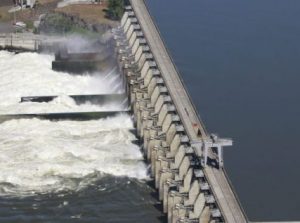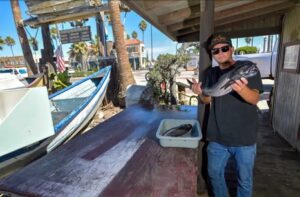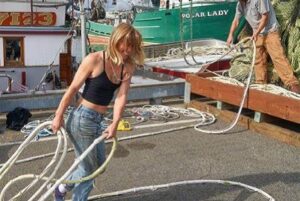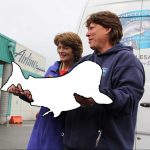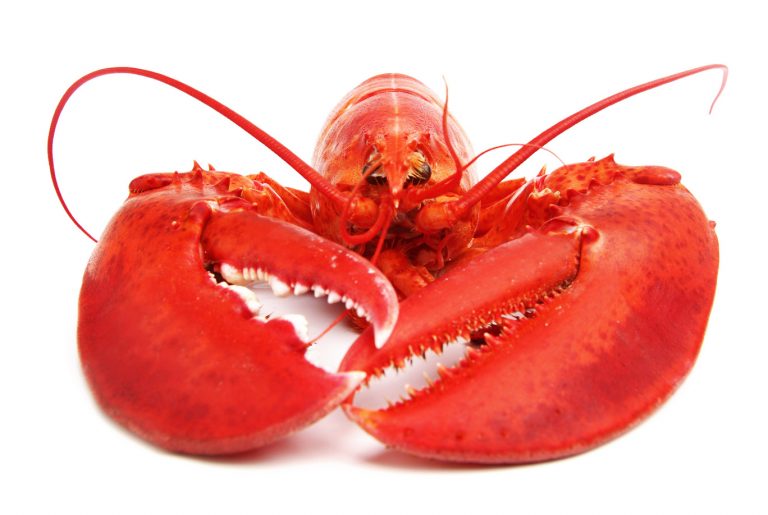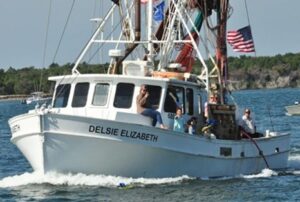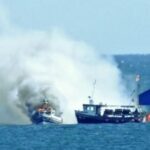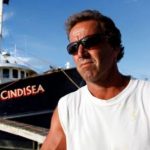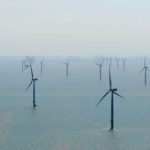Category Archives: Pacific

Crew Member on Local Commercial Fishing Vessel Was Lost at Sea This Morning, Coast Guard Calls off Search
The Coast Guard suspended its search Sunday for a Dungeness crab fisherman who fell overboard from the 47-foot commercial fishing vessel Chief Joseph approximately eight miles west of the South Spit in Humboldt Bay.,,, Two crewmembers aboard the Chief Joseph reportedly fell overboard while attending to crab pots around1:10 a.m. The vessel captain was able to pull one person back aboard but could not see the other fisherman. The man who was retrieved had no reported injuries. >click to read< 22:06
Coast Guard Calls of Search for Crabber Lost at Sea – According to his family, Bryan Scott Moore was lost at sea. His fellow fisherman pulled from the water 8 nautical miles west of the south spit. >click to read<
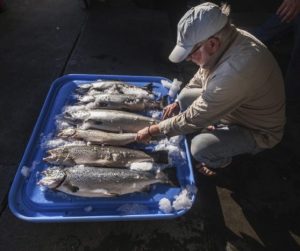
State of Washinton cancels lease at site of salmon net-pen collapse
Washington state officials on Sunday canceled a lease with Cooke Aquaculture Pacific at the site where net pens holding farmed Atlantic salmon collapsed last summer, releasing tens of thousands non-native fish into Puget Sound. The decision comes days after a multi-agency state investigation found the Canada-based company negligent for failing to adequately clean its nets, saying that directly contributed to the net-pen failure in August at the facility. >click to read< 17:54
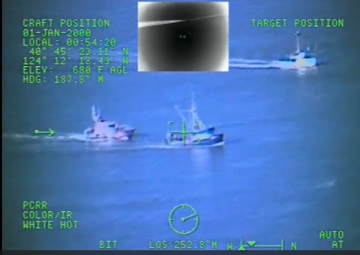
Three Fishermen and Their Boat Rescued Near Humboldt Bay
The Coast Guard aided three fishermen in distress after the engine room on their vessel began flooding near Humboldt Bay, Saturday. A good Samaritan issued a mayday Coast Guard Sector Humboldt Bay watchstanders via VHF-FM channel 16 around 10 a.m., reporting that the commercial fishing vessel Gerry B was taking on water and had no electrical power or communications eight miles south of the Humboldt jetties. The fishermen were reportedly donning life jackets and preparing to abandon ship. >click to read< >Video<09:11
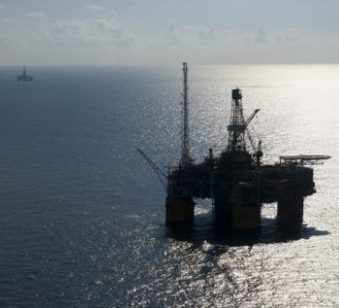
State attorneys general are spoiling for a fight over Trump Administration’s offshore drilling plan
As Interior Secretary Ryan Zinke prepared to travel to the Carolinas to discuss offshore drilling, state attorneys general condemned the Trump administration’s plan to expand development of oil and gas in the Atlantic and Pacific oceans as “outrageous” and “reckless.” Maryland Attorney General Brian Frosh (D), one of a dozen state attorneys general on the two coasts to co-sign a letter Thursday that called on Zinke to cancel the proposal, said, “We intend to sue if they go forward with this, unquestionably. We’re going to do everything we possibly can to stop it.” >click to read< 17:49
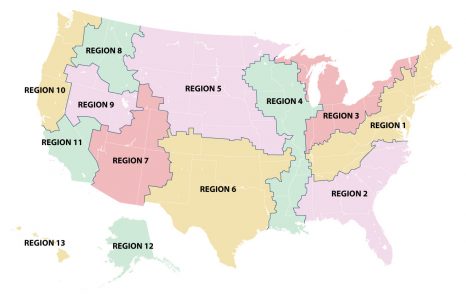
A new push to deregulate America’s oceans and backcountry
Recent decisions at the Interior and Commerce departments are opening the doors for more commercial exploitation of US fisheries and land resources. Advocates say the changes finally allow local voices to be heard. Critics say science is being ignored in favor of industry.,, But while these lands and waters may belong to every American, some feel particularly invested, including the roughnecks, loggers, fishermen, hunters, snowmobilers, and miners who eke out tough livings from rough but beautiful surroundings. Many of them, like New Hampshire boat owner, biologist, and former fishery council member Ellen Goethel, have watched resources grow increasingly off-limits under what she calls a “one-size-fits-all” conservation approach implemented by the Obama administration. >click to read< 11:48
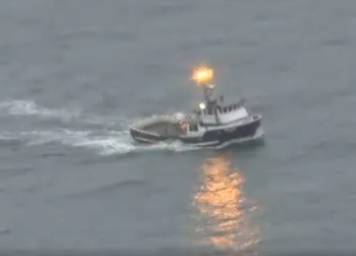
Oregon Dungeness crab season underway, USCG checks in on fleet
Dungeness crab off the Oregon coast has been a staple in the region for years and a big boost to the coastal economy, and it takes a team effort to make sure everyone is playing by the rules during the commercials season. On Thursday a U.S. Coast Guard C-27J Spartan flew up from Sacramento to help Guardsmen in Astoria check in with the Dungeness crab fishing fleet. >video, click to read<10:25
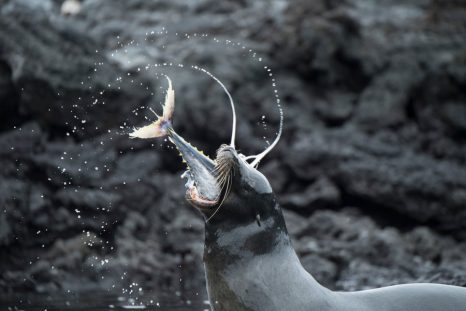
View to a Kill: Galápagos Sea Lions Team Up to Capture Huge Tuna
In the Pacific, off the Galápagos Islands’ coast, a clever ploy leads to a hearty feast. Sea lions cannot typically catch massive yellowfin tuna—which can swim at speeds of around 40 miles per hour. But a few fishermen recently reported a peculiar hunting behavior among the Galápagos dwellers: Using teamwork, the sea lions have been chasing and trapping the tuna in coves along the archipelago’s ragged coast. Photographer Tui De Roy, a Galápagos resident, recently captured this behavior in a series of striking images. >photo’s, click to read<09:22
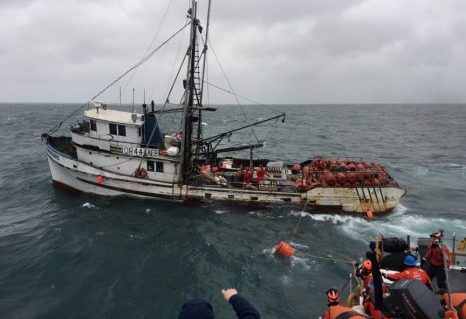
Coast Guard rescues 5 fishermen from flooding fishing vessel
Coast Guard crews rescued five fisherman, who had to abandon ship due to flooding while west of Cape Alava, Wednesday. A 47-foot Motor Life Boat crew from Coast Guard Station Quillayute River safely took the fishermen aboard and transported them to Coast Guard Station Neah Bay with no reported medical concerns. Watchstanders at Coast Guard Sector Puget Sound received a report at 1:14 p.m. the 87-foot fishing vessel Sunnfjord was flooding and with all their dewatering pumps running the crew was unable to keep up with the rising water. >click to read< 21:43
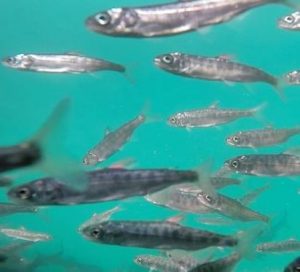
For first time in 60 years, spring-run Chinook salmon reproduce in San Joaquin River
As work to restore the San Joaquin River continues, scientists are seeing promising signs that salmon can thrive in the river as hatchery fish reach new milestones. A recent breakthrough came in fall 2017, when spring-run Chinook salmon created their nests, called redds, in the deeper and colder parts of the river below Friant Dam. The fish successfully spawned, laying eggs that incubated and hatched into tiny fry as the sexually mature fish died, part of the species’ unusual life cycle. >click here to read< 15:16
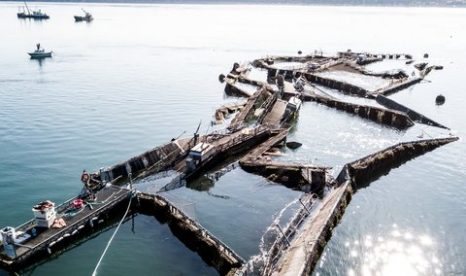
Fish farm caused Atlantic salmon spill, state says, then tried to hide how bad it was
Cooke Aquaculture Pacific vastly underrepresented the scope of a catastrophic Atlantic salmon net-pen spill at its Cypress Island farm last August and misled the public and regulators about the cause, according to a new report by state investigators that blames the pen collapse on company negligence. The investigation found that Cooke lowballed the number of escaped fish by more than half, and did not do essential maintenance at its farm, causing the escape. The company also misled agencies about the seriousness and cause of an earlier mishap,,, >click here to read< 20:26
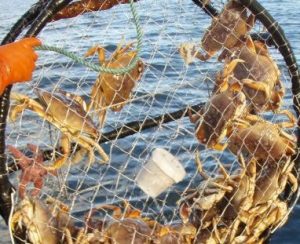
Crab season: ‘Fishermen just needed to go fishing’ while skinny crab adds stress
The opening of the commercial crab season is traditionally December 1, but this year it was delayed to ensure quality and to work out negotiations between fishermen and processors over price.
While crabbers in Newport agreed to a $2.75 starting price, we were told Friday the offer was not accepted by the majority of west coast fishermen. >click here to read< 16:54
Skinny crabs add stress on local business owners – Scattered crabbing vessels dotted the horizon from Klipsan Beach and along the southwestern Washington coast last Monday. It was the start of the new commercial crabbing season — and possibly, sellers hope, the rebounding of the local market. Pacific Northwest crabbers have already lost over one and a half months’ worth of the crab season. >click here to read<
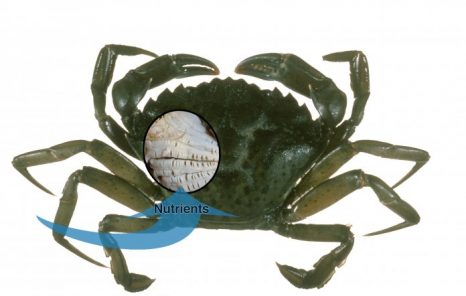
A green crab’s super power: eating through its gills
The phrase “to inhale your food” evokes images of hot dog eating contests or late night fast food binges. But for the European green crab, the phrase is a bit more literal—these crabs can actually absorb food through their gills.,,, Called the shore crab in its native waters around Europe, the European green crab is an invasive species that began wreaking havoc in New England coastal ecosystems following its introduction in the 1800s. It has no predators or competitors and also a killer appetite—crab, fish, young lobster, and shellfish are no match for its nimble, yet crushing claws. >click here to read< 11:27 

HR 2083 – Inslee beats drum for Herrera Beutler bill, urges U.S. representatives to back plan to protect fish runs
Gov. Jay Inslee is urging U.S. House representatives from Washington, Oregon and Idaho to support a bill penned by Rep. Jaime Herrera Beutler, R-Battle Ground, that seeks to reduce sea lion predation on at-risk fish populations, including salmon and steelhead. Inslee sent a letter to the Northwest delegation asking for support Friday with the support of Oregon Gov. Kate Brown and Idaho Gov. C.L. “Butch” Otter. >click here to read< 13:37 
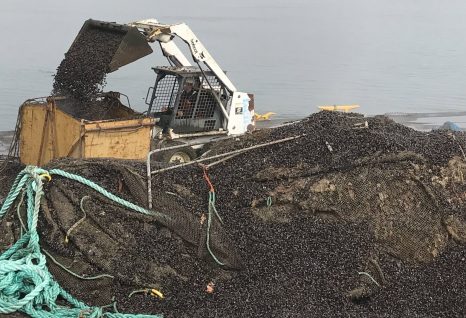
State investigators focus on nets plugged with mussels in Atlantic salmon net-pen failure
Investigators probing the collapse of an Atlantic salmon farm that sent 160,000 invasive fish into the Salish Sea last summer are examining mussels and other sea life coating the nets as cause. Photographs obtained by The Seattle Times under a public records request show portions of the nets at Cooke’s farm were so fouled with kelp, algae and especially mussels that the net was no longer visible.,, Cooke is required under the terms of its lease with the state to maintain its farms in a clean and safe condition. >click here to read< 21:10
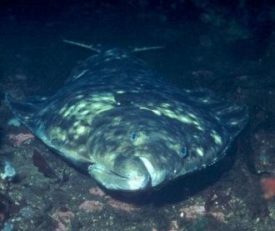
International Pacific Halibut Commission disagrees on catch cuts
Commissioners from the U.S. and Canada this week could not agree on the size of catch reductions that fishing fleets in the two countries should take for halibut along the Pacific coast this year. Commissioners from the two countries signaled their intent to make fishing cuts for the valuable bottom fish but not as large as the cuts suggested by staff earlier this winter. The six-person commission has three members from the U.S. and three from Canada. Their annual meeting was in Portland, Oregon January 22nd-26th. >click here to read< 20:21
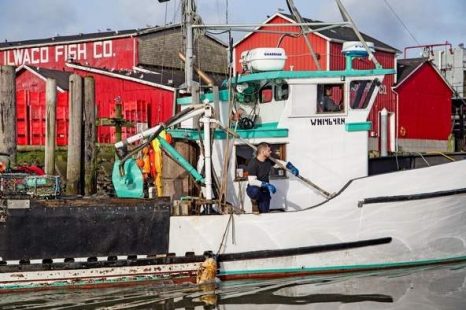
Hardworking crabbers deserve support and encouragement
A look back at several years of news about the Columbia River Dungeness crab industry highlights trends and problems that need a better-coordinated response.,, This season is the second in a row in which independent crab boat owners and operators have attempted, unsuccessfully, to exercise cooperative leverage to win better prices from processors. In both years, weeks of unrelated delays beyond the traditional Dec. 1 start left most crabbers in a weakened position. Plenty of family budgets are built around the assumption that some of the year’s biggest paydays will start refilling bank accounts from December through about February. >click here to read< 17:02
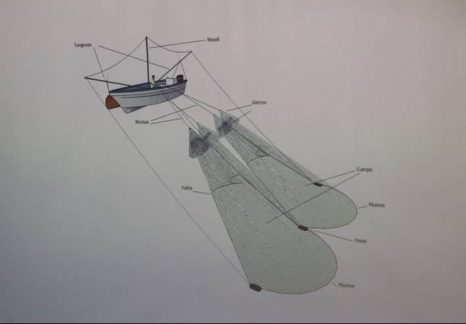
Memorial University flume tank being used for critical conservation work
In the Upper Gulf of California, Mexico, gillnets used in the shrimp fishery have received much of the blame for the plunge in the numbers of a rare marine mammal known as the vaquita.,, One of the key challenges is to encourage Mexican fishermen to change from traditional fishing gear — to get rid of the kilometre-long walls of gillnets in the water that entangle and drown vaquita and other bycatch — and use alternative fishing gear that will be more selective and vaquita-friendly. Such alternative gear is being tested this week in the flume tank of the Centre for Sustainable Aquatic Resources at the Fisheries and Marine Institute of Memorial University in St. John’s. >click here to read< 13:16
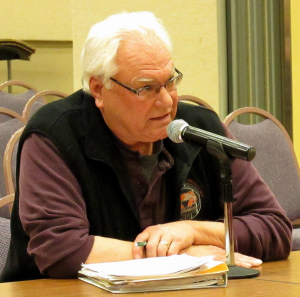
Washington State: Council unanimously opposes coastal oil and gas drilling
The Ocean Shores City Council on Monday unanimously adopted a resolution that opposes offshore oil and gas activities off the coast in response to a pending Trump administration proposal to permit drilling in most U.S. continental-shelf waters. “Our Washington coast is one of the most wonderful places in this entire world,” said Ocean Shores Mayor Crystal Dingler.,, Larry Thevik, the president of the Washington Dungeness Crab Fishing Association and a 47-year resident of Ocean Shores, said he was also speaking on behalf of the Washington Trollers Association and the Westport Charterboat Association. >click here to read< 17:24
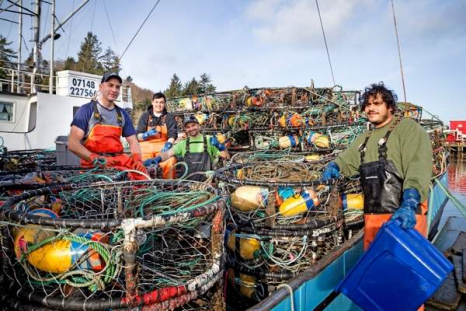
Dangerous swells will complicate harvest this week as Crabbers go to sea
An informal Dungeness crab price strike ended this week on the Washington and Oregon coast after Newport-based crabbers decided to accept $2.75 a pound from Trident Seafoods. Columbia River-based crabbers began soaking pots at 9 a.m. Monday. Crabbers didn’t reach a formal agreement with industry giant Pacific Seafoods after days of stalemated talks in which fishermen sought a starting price of $3 a pound for wholesale deliveries to processors. Last year’s price was $2.89 a pound. >click here to read< 11:53
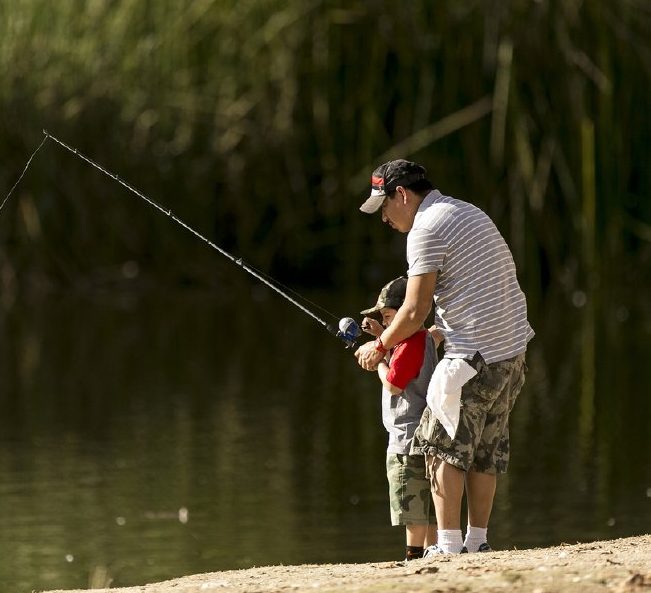
H.R. 200 – More than one way to manage the nation’s fisheries
For the first time ever, reauthorization of the nation’s overarching marine fishery management law will take into account concerns of America’s recreational anglers. In mid-December, the U.S. House Committee on Natural Resources approved H.R. 200, a bill sponsored by Rep. Don Young, R-Alaska, amending the 1976 Magnuson-Stevens Fishery Conservation and Management Act. While the vast majority of the public hails progress on the bill as long overdue, an unusual coalition of environmentalists and commercial fishing entities has roundly condemned it, feverishly depicting the bill as an attack on the oceans and a threat to the future of the nation’s marine resources. >click here to read< 20:57
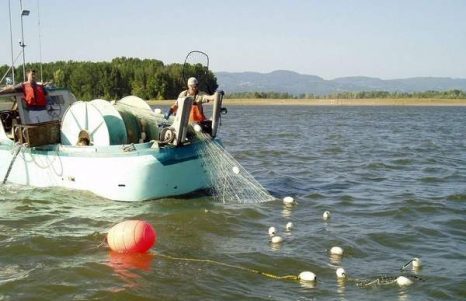
Despite frustration, observation plan yields new fish data
Gillnet fishermen bristled at a requirement to carry state observers last fall, but what felt like a burden to the fleet may have turned out to be a blessing. Preliminary data collected on the trips show that the number of steelhead fishermen kill while trying to catch other fish may actually be much lower than the historic rate. It’s good news for a fishery that has been under fire for using gear opponents say harms fish runs — and even better timing. Last year’s steelhead run was one of the worst returns in decades. >click here to read< 16:13
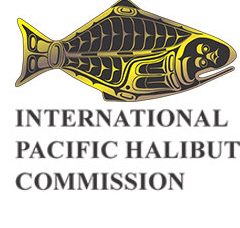
International Pacific Halibut Commission is Meeting in Portland, Oregon January 22-26, 2018
Hilton Portland & Executive Tower – The 2018 Navigating IPHC AM094 document now available. The deadline for Regulatory and Catch Limit proposals, and Stakeholder comment (23 December 2017) has now passed. Further comment may be provided in Session. All sessions are open to observers and the general public, unless the Commission specifically decides otherwise. All sessions will be available via webinar. Webinar attendees will be able to make comments and ask questions as noted on the schedule with other meeting attendees. Please register for the meeting on Eventbrite if you plan to attend in person. Please register for the webinar>click here< if you would like to attend the meeting via webinar. >click here to read info< 20:27
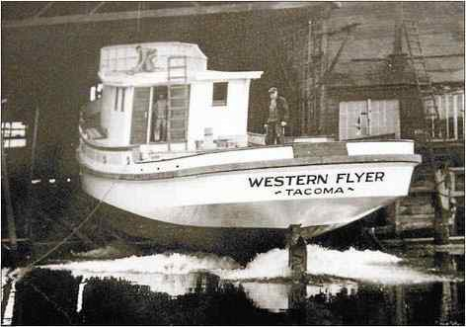
Steinbeck boat being restored – A crew is bringing her back to life, plank by plank, spike by spike, nail by nail.
Somewhere in the Western Flyer there is a spirit, said Chris Chase, project director for the Western Flyer Foundation, the nonprofit group restoring the fishing boat that carried Ed Ricketts and John Steinbeck to The Sea of Cortez in 1940. “I don’t know who it is,” said the 51-year-old shipwright. “It could be Ed (Ricketts). It could be John Steinbeck. It could be Carol Steinbeck (John Steinbeck’s first wife).” Whoever it is, something has saved the 80-year-old, 77-foot purse seiner from destruction. >click here to read< 14:31

Crabbers set to snap – Frustrations mount as price deadlock and towering swells delay season
Frustrations grew Tuesday as crabbers and processors continued drawn-out negotiations over 2018’s opening price for Dungeness crab. All was silent in the Ilwaco channel and Port of Chinook in recent days when boats ordinarily would have been noisily traveling back and forth to crabbing grounds. No lights bobbed on the ocean off the Long Beach Peninsula. Commercial crab harvesting was set to open Monday south of the Klipsan Beach line, but price negotiations and ocean conditions are keeping boats in port. >click here to read<15:08
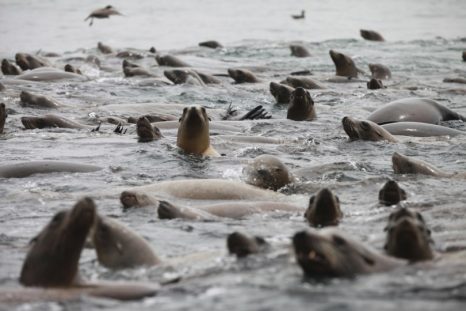
A quarter million?! California sea lion population has tripled, new study finds
The West Coast’s population of California sea lions — the playful marine animals that delight tourists on the Santa Cruz waterfront and San Francisco’s Fisherman’s Wharf while competing with salmon fishermen for valuable catches — has tripled in the past 40 years to more than 250,000.,,, But California sea lions — which range from Mexico to Alaska — have exploded the most in number, jumping from an estimated 88,924 in 1975 to 257,606 in 2014, according to the new NOAA study. But all the sea lions have caused problems. >click here to read<11:33
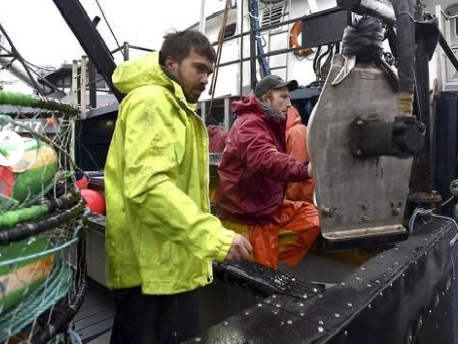
Price talks delay Dungeness crab season
Crab boats loaded with pots sat at the docks all weekend while fishermen and processors remained in a gridlock over prices. The commercial Dungeness crab season was set to open Monday in most of Oregon and Washington state, but price negotiations and ocean conditions are keeping boats at home.,,, At one point major processors had offered crabbers $2.30 a pound — not nearly enough to convince them to go out, local crabbers said. >click here to read< 14:12

2019-2024 National Outer Continental Shelf Oil and Gas Leasing Program Public Meetings Scheduled Nationwide
Public meetings will take place across the country using an open-house format, so participants can arrive any time during the scheduled meeting time. At the meetings, participants can ask questions, share information, talk with our team members one-on-one, and learn more about the National OCS Program. We also encourage participants to submit written comments to inform BOEM of specific issues, impacting factors, environmental resources, alternatives to the proposed action, and mitigation measures to consider in its analyses. For those unable to attend one of the scheduled meetings, BOEM is offering a Virtual Meeting Room where participants can visit the same stations available at the open house meetings. There they are able to review and download the same handouts and posters offered at the meetings and provide comments. >click for times, dates, and locations<15:36

Government for hire: Washington State contracted to green nonprofit
The Wall Street Journal’s scrutiny of Washington Governor Jay Insee’s office continues after new details were revealed about policy advisor Reed Schuler. “Basically, what we found out is that the World Resources Institute, which is a green nonprofit, and the Hewlett Foundation — which has invested massively in the green climate change agenda — is paying his salary; is paying his benefits, and paying his expenses,” >click here to read<11:42






